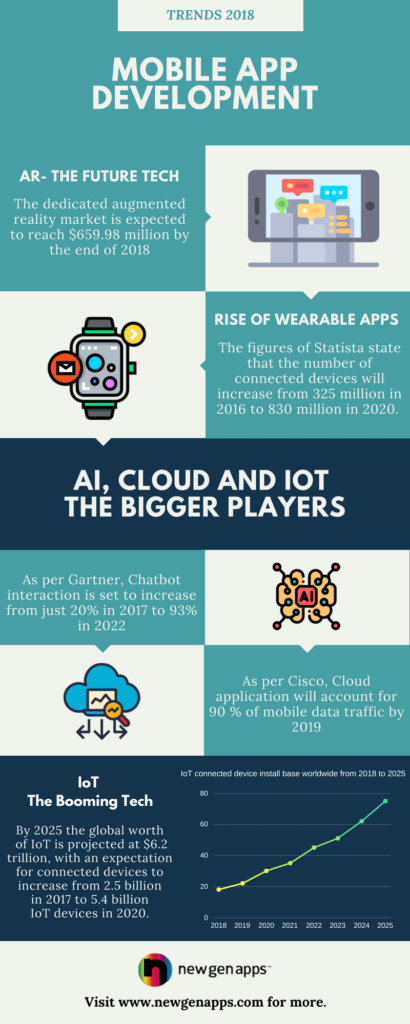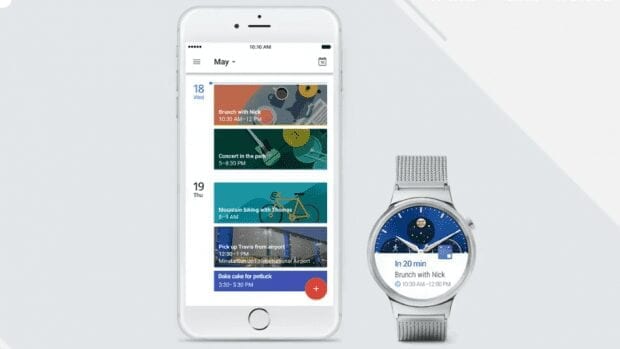![Top 10 Mobile App Development Trends 2018 [Infographic]](https://www.newgenapps.com/hubfs/Imported_Blog_Media/Mobile-app-development-trends-2018-1-410x1024.png)
Mobile apps have been the center of innovation for many years. With the ever-growing market and modern technologies coming up it is tough to stay relevant and competitive. With the largest market penetration and flexibility, mobile devices prove to be the best device to be targeted by businesses. While all these statements are true, it should be noted that moving to mobile isn't something new for a company especially in 2018.
If you want to get decent engagement from mobile then you’ll need to step up your application and provide a unique user experience. To help you in your mobile initiative we at NewGenApps, have gathered top 10 mobile application development trends so that you can easily capitalize on the latest innovations. Just take your pick and feel free to get in touch with us for more clarity or project discussion.

The 10 Must Follow Mobile Application Development Trends in 2018:
1. Augmented Reality:
According to Digi-Capital, by 2020, AR/VR could hit $150bn, with AR taking around $120 billion and VR $30 billion.
It seems like the year 2017 was earmarked by both Google and Apple for banking on the development and accessibility of augmented reality. With Apple launching ARKit and Google’s ARCore hitting the market, we now have two rock-solid platforms for the development of augmented reality apps for mobile devices. With most marketers seeing augmented reality as a way to provide a compelling user experience we will soon be seeing a lot of creative AR apps.
Mobile app marketing is as important as developing the app. Without a proper go to market strategy your app will not be able to attract any audience. Download our free guide to enjoy a direct access to some of the most compelling ways to stand-out in the app market:
2. Wearable Apps:

Smart watches and other connected wearables have created an altogether new technology market. While many of these devices can provide standalone features they still require some support from mobile for instance before the WatchOS 4 the Apple Watch needed iPhone’s network for calling. Except for this, users prefer wearable devices to be synchronized with their mobile phones for easier access to data.
3. Instant Apps:
At the Google I/O 2016, Google launched a new feature in Android devices called the instant apps. The aim is to make it easy for users to use an android app without actually downloading it. The user can try the mobile app using the play store and download it only if they feel the need and have the requisite storage. Wish, Viki, Buzzfeed and Periscope are the pioneer apps to take this initiative. Soon there will be more additions to the list.
4. Lazy Loading and AMP:
AMP (Accelerated Mobile Pages) is a project undertaken by Google in association with Twitter. Using AMP, a mobile version of the web page is created that is comparatively a lot faster and responsive. As an alternative, the webpage can be displayed simultaneously while it is loading instead of making the user wait for the whole page to load - it is called lazy loading. Both these techniques can be used to speed the performance of mobile apps when content is syndicated through the web.
5. IoT:
The Internet of Things (IoT) allows the use of sensor technologies in non-IT devices to enable remote control, automation, and monitoring. With a boom in IoT applications, it is obvious for developers to opt for the most noticeable choice when it comes to remote devices. A majority of IoT devices already rely on mobile devices to syndicate data, especially in case of consumer IoT. With the surge in overall uses of IoT, we will see more mobile apps meant for management of these devices.
6. Artificial Intelligence:
Artificial intelligence has enabled many exciting features in mobile apps like recommendation engines, personalized experience, behavioral targeting etc. Apart from these features, it has also enabled the use of chatbots in mobile apps. Chatbots are AI-powered tools that can stimulate human conversations. Though very few apps actually included a chatbot, we will definitely see more applications doing this in future or at least they will synchronize their app with a Facebook Messenger Bot.
7. Cloud Computing:
The rise of mobile cloud computing has a lot of benefits backing it. With the use of cloud computing in mobile apps it easier to store data and process heavy tasks in mobile. At NewGenApps, all the mobile apps that we recently built were hosted in AWS. This increases the reliability, speed, and security of mobile apps and allows for the maximum collection, storage, and analysis of user data.
8. Blockchain:
Satoshi Nakamoto, the inventor of the Blockchain, gave rise to a whole new type of currency - Cryptocurrency. Do you think that he thought that his irreversible endless ledger could possibly redefine mobile payments? Well, considering that this is a pseudo name, we’ll never know. What we do know is that there is a rise in blockchain based payment apps like BitPay, Gliph, and Fold and there will be more in near future.
9. Mobile Payments:
The blockchain is not the only way to revolutionize mobile payments. With the rise of eCommerce, there is also a complimentary rise in the number of mobile payment apps and mobile banking. Also, more and more mobile payment mechanisms emerging. Consider the recent initiative of scan and pay system leveraged by VISA cards and Samsung. Soon there will be mobile payment apps leveraging that and more.
10. Security:
The enterprise mobile security is the new zone of focus for mobile app developers. With the increase in popularity of BYOD (Bring Your Own Device) policy, there is a substantial risk of enterprise mobile apps being affected by personal devices of employees. Developers are taking more rigorous initiative to secure the app’s code from the ground up. There is also an increased awareness towards better use of authorizations and encryption.
Bonus Mobile App Trend | Location-based Services:
Marketers are exploring the use of geofencing and location-based services on a large scale. These services offer scope to trigger specific actions in apps providing ample and distinguishing scope for personalization. Many brands have upgraded their apps to support location-based services like the support for Bluetooth beacons or tracking through network services. With 2018 we will definitely see a lot more application leveraging these technologies.
Do you want to upgrade your app to support either of the above discussed technologies? At NewGenApps, we specialize in mobile app development and have built our expertise over a period of 10 years. Get in touch with our team and we will help you solutionize your idea.



